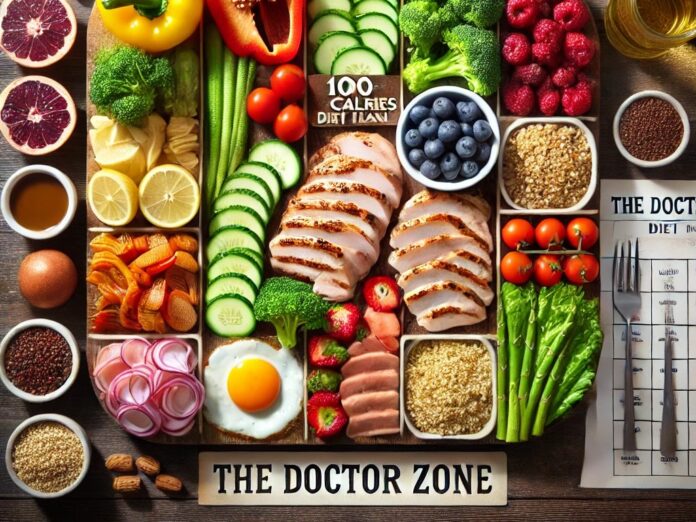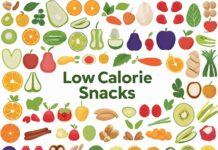The 1000-Calorie Diet Plan: Low-calorie recipes
Embarking on a 1000-calorie diet can be an effective strategy for rapid weight loss. However, it’s crucial to design this low-calorie diet thoughtfully to ensure it’s nutritionally balanced and sustainable for short-term goals. In this guide, we’ll delve into how to structure a 1000-calorie diet, offer meal plan suggestions, and discuss both the benefits and potential risks. Always consult with a healthcare provider before beginning any new diet regimen.
What is a 1000-Calorie Diet?
A 1000-calorie diet plan involves restricting daily caloric intake to just 1000 calories. This approach is considered a severe reduction from the average daily calorie intake and should be managed carefully to maintain nutritional intake without sacrificing essential nutrients. Read more: Healthy Ninja Creami Recipes: Nutritious Ninja Creami Dishes
Benefits and Risks of 1000-Calorie Diet Plan
Benefits:
- Quick weight loss: Significant calorie reduction can lead to rapid weight loss solutions.
- Simplicity in meal planning: Reduces daily decision-making about food.
Risks:
- Nutrient deficiency: High risk of missing essential nutrients.
- Decreased energy levels: May impact physical performance and vitality.
- Not sustainable long term: This plan is not suitable for long-term health and may lead to weight regain.
Structuring a Balanced 1000-Calorie Diet Plan
Key Components:
- Protein: Lean meats, fish, and legumes to support muscle maintenance.
- Vegetables: A variety of greens and colorful vegetables for vitamins.
- Fruits: Low-calorie fruits like berries and apples.
- Whole Grains: Small portions of nutrient-dense grains like quinoa and oats.
- Healthy Fats: Avocado and nuts for essential fatty acids.
Sample Meal Plan of 1000-Calorie Diet Plan
Day 1:
Breakfast: Greek Yogurt Parfait
- 100g low-fat Greek yogurt (59 calories)
- 1/2 cup fresh blueberries (42 calories)
- A sprinkle of flaxseeds (30 calories)
Lunch: Turkey and Salad Wrap
- 1 small whole wheat tortilla (70 calories)
- 2 oz lean turkey breast (50 calories)
- Lettuce, tomato, cucumber (10 calories)
- 1 tsp mustard (10 calories)
Dinner: Grilled Salmon and Vegetables
- 3 oz grilled salmon (155 calories)
- 1/2 cup steamed broccoli (27 calories)
- 1/2 cup carrots (26 calories)
Snacks:
- An apple (95 calories)
- 10 almonds (70 calories)
Total Calories: 644
Tips for Success: 1000-Calorie Diet Plan
Staying Full:
- Drink plenty of water: Essential for feeling full and hydrated.
- Eat high-fiber foods: Increases satiety and aids digestion.
Monitoring Health:
- Consult with a nutritionist: Ensure your diet is balanced.
- Monitor your energy levels: Vital for adjusting the diet to maintain healthy living.
When considering a 1000 calorie diet, it’s important to approach this approach with caution and be apprehensive of the goods it can have on your body. While such a diet can lead to significant weight loss due to a significant reduction in sweet input, prioritize your health and nutritive requirements over calorie pretensions alone.
First, it’s important to have a balanced diet. This diet should contain plenitude of vitamins and minerals, and you can get it by including a variety of fruits, vegetables, spare proteins, and whole grains in your diet You have to choose each food designedly to get nutrition which is high in every calorie you eat. Choosing spinach or kale, for illustration, provides further vitamin A, C, calcium and iron, all while being lower in calories.
Also, it’s important to understand boundaries and hear to your body. However, depression, or extreme hunger, If you witness symptoms similar as fatigue. Regular check– ups with a health professional can insure that your weight loss trip is safe and effective, and help you make the salutary changes you need to meet your health requirements.
Conclusion
The 1000-calorie diet is a significant adjustment that requires careful planning and monitoring to ensure it provides adequate nutrition and energy. While it can lead to quick weight loss, it’s vital to approach this diet with professional guidance and consider it as part of a broader weight management strategy. Tailor the diet to your individual health needs and always prioritize long-term health over short-term gains.
FAQS
Q 1: Is a 1000-calorie diet safe for everyone?
Answer: No, it’s suitable only for short-term use under medical supervision and not recommended for highly active individuals, pregnant women, or teenagers.
Q 2: How long can I follow a 1000-calorie diet?
Answer: Only for a few weeks, as recommended by a healthcare provider, due to potential nutrient deficiencies.
Q 3: Can I exercise while on a 1000-calorie diet?
Answer: Opt for light activities like walking or gentle yoga, as vigorous exercise isn’t advisable with such low energy intake.
Q 4: What should I do if I feel hungry on a 1000-calorie diet?
Answer: Eat high-fiber foods and drink plenty of water to manage hunger and maintain fullness.
Q 5: How can I ensure I’m getting enough nutrients on a 1000-calorie diet?
Answer: Focus on eating nutrient-dense foods and consult a nutritionist to ensure your meals are balanced.








